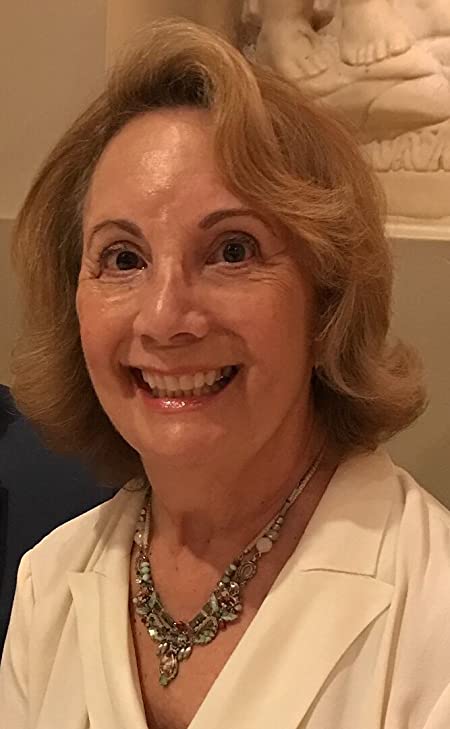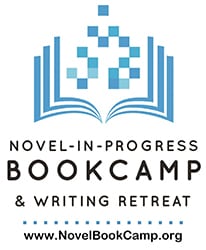Novel-In-Progress Bookcamp & Writing Retreat, Inc.
Success Stories
Interview with Susan Van Dusen, attendee in 2014 and 2016

Fiction, Cozy Mystery
Paperback, 266 pp
Published April 2, 2021
Buy the book on
Susan Van Dusen

Susan Van Dusen is an award-winning writer of editorials and magazine articles. She has written three books for children on the history of Skokie, and The Synagogue: a Home for the Jewish People. The Missing Hand is the debut book in a series of cozies based on a Torah group solving mysteries using Jewish tradition. She is a member of OCWW, Chicago Writers Association and Sisters in Crime. To learn more, please visit www.susanvandusen.com
The Missing Hand
A valuable heirloom has been stolen from a member of Julia Donnelly’s Torah study group. Grievous sins of the past have pushed their way into the present. Murder, distrust, and ill-gotten gains from World War II Bohemia threaten the peaceful Jewish community of Crestfall, Illinois. Julia, wife of this small town’s mayor and mother of two young adopted sons, is pressed into service to find the bejeweled heirloom which is called a yad, a Hebrew word which means “hand” in English. It is a rod\-shaped item with a bulb on the top and a hand with a pointing finger at the bottom that helps keep one’s place when reading the Torah. This particular yad is covered with a fortune’s worth of jewels. With no experience except watching TV detective shows, Julia and Torah group leader Rabbi Fine attempt to solve the mystery and address the misery it causes. After finding the yad, another mystery, much deeper, explores good and evil in the character of the man who brought the yad to America and escaped punishment for his crimes after the war by posing as a Jewish immigrant. Heady stuff for a cozy, but humor takes the sting out. The Donnelly family goes at 90 miles an hour, hollering, hugging, and loving. It all works out in the end. Remember, we all have our own michegas. As we say in Yiddish, Plotsn zolstu-fun nachos, “May you explode from pleasure” after reading this book.
Susan, what guided your decision to attend Novel-in-Progress Bootcamp?
I knew that I wanted to write books. I had ideas, but I knew nothing about the “how” of writing a book, development of plot and characters, nor had I spoken to people who had written books! Though a book writing book critique group which met monthly, I met someone who had attended NIP who suggested that I would learn a great deal by attending. That was my first “professional” entry to the joy and challenge of book writing.
My book writing changed after attending Camp. There are two kinds of writers, Pantsers (people who write by the seat of their pants), and Planners. I learned the difference. I learned to sit and think carefully what direction my book would go. I learned to create back stories for each character, so I knew them very well by the time I started writing about them. One suggestion at camp, which I tried for one book, was to take a large cardboard and plot chapters on it and fill them in as I went. It was very freeing, because I knew what was going to happen in each chapter.
Camp taught me not to quit. For two entire sessions of camp, I hunkered down in the cafeteria and wrote. Not every word was golden, but it sent me further into my story. There is always time for rewrites.
My book began in my head at least 45 years ago when I went to Canada for some special surgery. I saw a hand puppet salesman on the street. He had one particular puppet with a hat and a beard with a black body. For a particular reason, I bought it and have kept Peter Stepanovich with me since that time. I knew he would be important to me later in life. Then bits of things popped up in my brain – an interest in Transylvania and Bohemia, the Holocaust, what did Jews do with their valuables during the war? A story began to develop. I began it with 1939 World War 11 in Bohemia where the character Peter Stepanovich, my puppet, was a poor farmer’s son living in a very abusive household. I followed him to present day America. Then, as the adage says, write what you know, I brought in present day daily life, a woman, her family and her Torah Group. An heirloom was stolen, and Julia, an amateur sleuth was tasked to find it.
My book critique group loved the writing, but felt that beginning of a cozy, a more genteel book, didn’t work well with such a harsh beginning, so I changed the order of the book and made it more readable. I learned to listen to people who critique one’s book.
When the book was finished, I found myself in a quandary. I had a niche book in a niche. It was a cozy, which has its own rules (which are now changing), no sex, no swearing, no violence (on scene), etc. Within that niche there was another, it was a Jewish book, illustrating to readers the different types of Jewish practices one finds in society. Where to go? First, I went to Jewish publishers, but most of them publish educational books for children. Others only accept books from agents. I didn’t have an agent. I sent out many queries but received no takers. Finally, one of the publishers at Book Camp (both publishers and writers speak to students who attend) said he’d publish my book. Unfortunately, he passed away. I received another publisher’s name from a rabbi who published her books with him. He accepted me on a two-book basis. The whole process took some four years.
I would greatly recommend Book Camp to others. It gave me my sea legs. It helped me understand the why’s and how’s of writing, things that many of us know, but don’t apply to a book, like making sure to use all of our senses when describing scenes.




